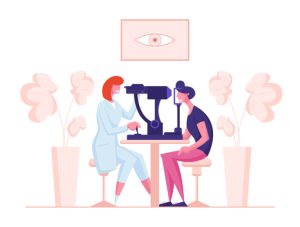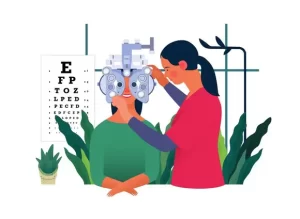Part five of optometry is mainly spent in clinic with no lectures scheduled. You will also spend six weeks on externships, which you can read in the externship guide. Part five is arguably the easiest year out of the whole degree though you will be split into streams, possibly away from your friends. Good grades aren’t as hard to get as a good chunk of the mark comes from assignments and clinic. In this guide, I will give tips for each core paper with FAQs at the end.
OPTOM 510
- Clinic sessions comprise general CEEs and specialty optometry such as dry eye, contact lenses, paediatrics and low vision. You will also be sent to external clinics such as Greenlane Hospital, Eye Institute, Re:Vision, etc, to observe and perform eye exams in different settings.
- No, not everything from part 2 will be tested in the 510 tests. Focus on the bones of the orbit and physiology of the eye, such as epithelial healing, aqueous production and drainage etc. Revise wisely, I didn’t revise any content regarding the retinal vessels or psychophysics, and it never came up.
- PEE exams are practice patient exams that you don’t HAVE to pass. They are there to track how you are doing and are marked and contribute to your overall 510 grade.
- In our year, ~80% of the class passes the final CPEs in the first round. This trend will likely continue for future cohorts due to more clinical exposure and improved teaching.
OPTOM 520
- You will do three presentations regarding the specialty topics of contact lenses, binocular vision and low vision. Watch for potential cases to write about during 4.5 and part 5 clinic sessions. These presentations are due at the end of the year, so you will have plenty of time to prepare.
- Remember to revise well for all the specialty optometry topics for your 520 test. For dry eye, I recommend you revise the dry eye grading scales and the pathophysiology of dry eye disease.
- Don’t stress too much about the quizzes at the start of the year, but don’t forget to do them. Reading all the papers can take a long time, so allocate your time accordingly.
OPTOM 561
- You will be doing several ocular therapeutics case presentations and one ocular health case. Start looking for cases now that involve interesting pathology and oral or topical therapeutics to write about in part five.
- The ocular therapeutics and health presentations are in a group setting, and it’s pretty chill. You don’t need to prepare slides, and it’s mainly a discussion. Be prepared to answer tough questions from Geraint!
- I recommend writing your reflections, assignments and presentations during your externship and any free time throughout the year. This can be a huge burden off your shoulders!
- You also need to submit three cases for your ocular therapeutics oral exam requiring therapeutics for red eye, cornea and glaucoma. Corneal cases can be harder to come by, so pick and choose which case you want to use for your OTDCP since you can’t present a case more than once.
FAQS:
Tips for CPEs?
Some of it is based on luck and the patients you get. I recommend revising BV (prescribing prisms), therapeutics and general retinal pathologies. My no.1 advice is that you probably didn’t do as bad as you thought. Everyone thought they did terribly for CPEs, yet most of the cohort passed. Just because you thought you did badly in one section e.g. refraction, don’t give up!
What are the marking rubrics for CPEs?
You can’t fail a section more than once in your three CPEs (pass at least twice), and you can’t fail too many sections in one exam.
What cases are in the oral therapeutics exam?
You will first answer questions from the case reports you submit, then answer what drugs/therapies you will give from a slide show of different diseases. You may be asked to resit this exam or write a separate short report of the things you missed. This is pretty chill, and most people pass with good marks.
What’s the expected salary range?
Salaries are usually transparent for grad roles. You can try to negotiate your salary for the roles you apply for, and some people have been successful in doing so. Be aware of the difference between the total package and your base salary. Your total salary package includes sign-on bonuses, usually for the first year only. Your pay technically decreases in the second year as you only have your base salary.
When should I start interviewing for jobs?
The two major corporate and private practices will hold seminars/events near the start of the year. I recommend you attend them as they are a good way to know what you may want in the future. Interviews usually start around May, and the interview process differs between companies. You usually apply for a role you want to interview for to the graduate manager for each company.
What are some interview tips and tricks?
My tip for this is cliche, such as being confident and being yourself. The interviews I had were pretty chill. We didn’t discuss anything technical about optometry, and it’s mainly why you want to work at the place you applied for, and who you are as a person.
Which company should I sign with?
Completely up to you. Some people prefer private practice, and others prefer corporate. You should get to know both and then make a decision. Some students want a specific location and don’t mind which practice they sign with.
Where should I go to work?
I had a pretty good idea of where I wanted to work after graduation: corporate, regional (not rural) and in Australia. This made it easy to look for potential locations to work at. Try to apply to externship locations where you might want to work, such as going regional to see if that’s the lifestyle you want.
Are there metro jobs?
Opportunities in metro Australia Sydney, Melbourne and Brisbane are much harder to find than regional areas and pay much less. Auckland jobs are quite sought after since many grads want to stay. Some jobs become available later, so don’t be pressured to sign early!
What should I look for when applying for a role?
Location and the people are important. If possible, you should visit the store in person to meet the team, but this can be hard, especially if it’s very far.
Can I change my mind and unsign?
Yes, I think it’s better to unsign than to go to a place you don’t want to, and many people have done so.
Tips for moving to Australia?
Remember to do your registration early, including the Police check and certifying documents for your AHPRA registration. If you are going to Australia for your externship, it may be a good idea to get a phone number, bank account etc.
This is likely the final guide on Clinical Outlook, it’s been an amazing journey over the past five years, and it might be time to say goodbye. Thank you for reading till the end, and all the best for the future!



